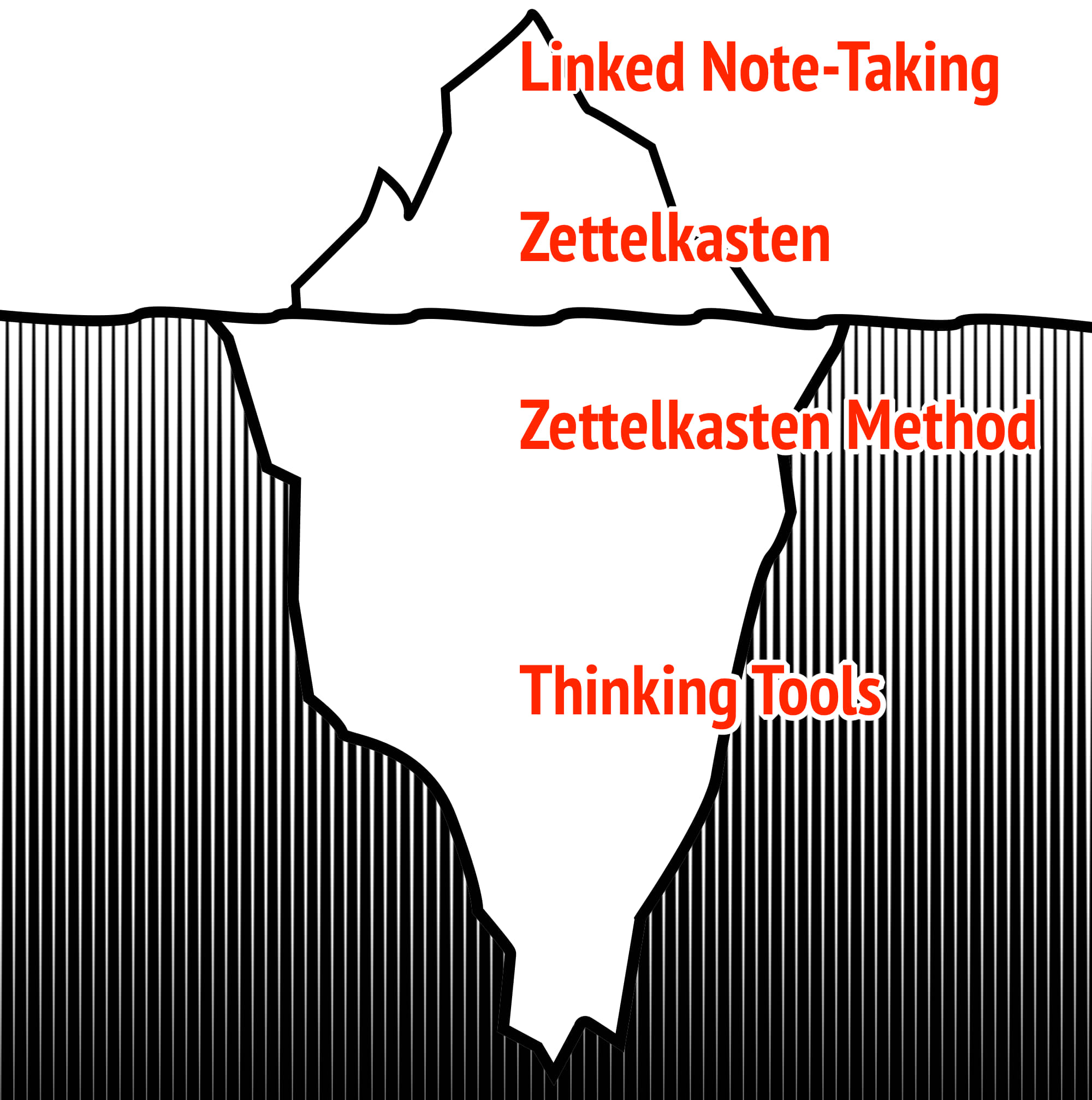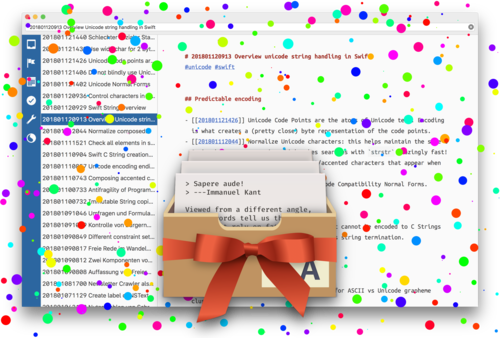Posts from 2024
Cal Newport vs Zettelkasten – SAD! (Clickbait)

Dear Mr. Newport, I listened to your podcast Episode 287 - Minimalist Notes with great horror and deep concern. I’m sorry, really sorry that you still don’t have a Zettelkasten. Interim note: Below are a few comments on Cal Newport’s podcast. I can’t hold on to fake outrage for too long. :)
The Collector’s Fallacy and Reward Dependency
Dear Zettlers, During a coaching session, I talked about a specific incarnation of the Collector’s Fallacy: Buying books and never reading them. My client correctly identified part of the cause for his behavior: He is using a Kindle to read. There, it is super easy to buy a book. So, when he sees a book that seems interesting, he buys it straight away. Part of the cause of this behavior is easy access.
Mindscapes: The Zettelkasten as a Thinking Environment

In the past article Mindscapes: Thinking Environments in Your Way of Living we looked at thinking environments in your life in general. One of these thinking environments is the Zettelkasten. Cal Newport sees the Zettelkasten Method as one of the many ways of managing knowledge. In doing so, he overlooks a very special characteristic of the Zettelkasten: the Zettelkasten is a very special thinking environment: it is integrated.
Mindscapes: Thinking Environments in Your Way of Living

Thinking needs space. Without this space, we cannot think. At least not with the depth and care required to achieve good results within a reasonable time frame. We create this space through thinking environments. One of these thinking spaces is the simple walk. A special aesthetic of erudition emanates from this form of walk. I would be surprised, for example, if someone imagined this walk in the industrial facilities of a chemical company. It is much more likely that one walks in nature or at least in a park to think.”
Cal’s Books are Salad
Hi Zettlers, What kind of (information) food are Cal Newport’s books? This is the question that I try to answer for myself. His term “ultra-processed content” is spot on for the
process that both food and content processing share: It is about
refining and combining key stimuli. Sugar, Fat, Salt, Protein — each
are specific stimuli that in isolation are not particularly
understandable (try eating pure sugar). However, cloaked in
engineered food and especially in combination, you can overload the
brain and generate the (hyper-)palatability.
The Heist – How to Process a Practical Book Quickly

If you don’t master the exploiting way of reading, you waste a lot of time and energy. Not every book should be processed in the same way. A novel contains different elements than a non-fiction book. But you also need to consider your own interests. For example, we read some books purely for the actionable information they contain. This requires an efficient and selective reading mode.
Strange Loops: Reading a Book on How to Read a Book
Dear Zettlers, Currently, I am slowly processing “How to Read a Book” by Adler and
van Doren. It is a classic book on reading, which I read more than a decade ago.
Contrary to the contemporary praise, I didn’t like it. The reason is
that you can learn a lot about reading, but I didn’t find anything
actionable. It reminded me of the SQ3R reading method which we learned
in university, only to find out that in practice nobody uses it.
The Zettelkasten in Action: My Book on Habit

I’d like to address the legitimate criticism of the Zettelkasten Method that there is little real world demonstration of its might and power. For this reason, I’d like you to present you my current project. I decided to attack a book on habit, because this book can hit two birds with one stone: The habit book is an essential part of my “What is a good live?”-series. It is one of the central supplementary instalments to the 5 volumes of the main series.
The Iceberg Theory of the Zettelkasten Method — Exploring the Depths

The Zettelkasten Method is not only a method of knowledge work. It is also a diagnostic tool. To demonstrate this, I would like to start with a short story from my work as a health and fitness trainer: A client contacted me because she wanted to lose weight. We discussed her situation and I sent her the first steps. One month later, she reported failure. She was unable to implement the program that we had discussed together. We reduced the program because my client said she was unable to implement it as planned due to time constraints and stress. The pattern repeated the next month. So we looked more closely for the causes. A surprising problem came to light:
Celebrating The Archive Anniversary with Exclusive Discounts

For this year’s anniversary of our app, The Archive, we want to show our gratitude to our amazing community by rolling out exclusive discounts for a limited time. Mark your calendars and don’t miss out on these fantastic deals: Day 1: Enjoy a whopping 75% discount on Friday, March 15th UTC+1
Field Report #7: How I Process “Atomic Habits” by James Clear

Those who do not react flexibly to the demands of the situation make themselves slaves to their stubbornness. When processing James Clear’s Atomic Habits, I deviate from the actually recommended reading method. The reason is: I work the way the book requires and not the way I would like to.